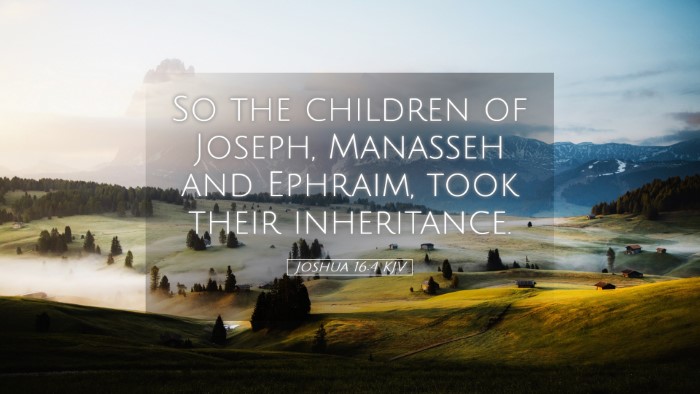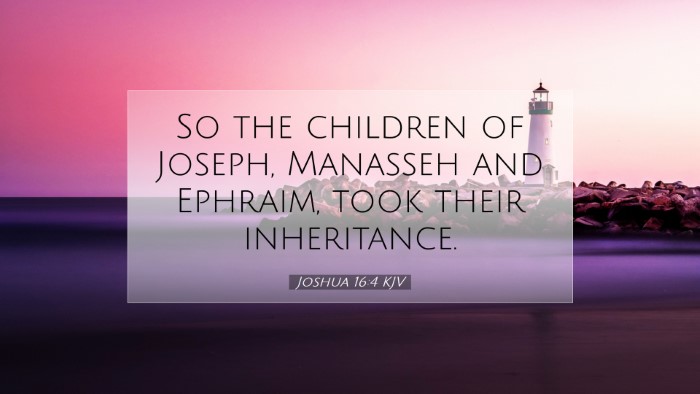Old Testament
Genesis Exodus Leviticus Numbers Deuteronomy Joshua Judges Ruth 1 Samuel 2 Samuel 1 Kings 2 Kings 1 Chronicles 2 Chronicles Ezra Nehemiah Esther Job Psalms Proverbs Ecclesiastes Song of Solomon Isaiah Jeremiah Lamentations Ezekiel Daniel Hosea Joel Amos Obadiah Jonah Micah Nahum Habakkuk Zephaniah Haggai Zechariah MalachiJoshua 16:4
Joshua 16:4 KJV
So the children of Joseph, Manasseh and Ephraim, took their inheritance.
Joshua 16:4 Bible Commentary
Commentary on Joshua 16:4
Verse: "And the children of Joseph, Manasseh and Ephraim, took their inheritance." (Joshua 16:4)
Introduction
This verse captures a significant moment in the history of the tribes of Israel as they receive their allotted inheritances in the Promised Land. It highlights the division of the land among the descendants of Joseph, which is critical for understanding the territorial claims of these two tribes: Ephraim and Manasseh. The inheritance reflects God’s promises and the fulfillment of His covenant to Abraham, Isaac, and Jacob.
Commentary Insights
-
Historical Context
Matthew Henry emphasizes the significance of the tribes of Joseph in this context. These tribes are seen not just as distinct entities but also as a continuation of Joseph’s legacy. Joseph had a prominent role in Egypt and his sons inherited a significant portion of the land, thus fulfilling Jacob's blessings and prophecies concerning his sons.
-
The Meaning of Inheritance
Albert Barnes explains that the concept of inheritance among the Israelites is more than material possession; it is laden with spiritual significance. The land is viewed as a gift from God, and each tribe's inheritance is a part of that divine promise, signifying God’s faithfulness.
-
Division of Land
Adam Clarke elaborates on how the land was apportioned between the tribes of Ephraim and Manasseh. The division was strategic, and their inheritance was critical for establishing a foothold in the land of Canaan. This act of inheritance represents not only ownership but also responsibility to uphold God's laws and to be lights to the nations surrounding them.
Theological Reflection
The passage prompts believers to reflect on their spiritual inheritance in Christ. Just as the tribes of Israel had a designated land, Christians are called to take possession of the spiritual blessings offered through Jesus. The inheritance symbolizes the eternal promises of God and the unending provision for His people.
Moreover, the unity between Ephraim and Manasseh signifies the importance of cooperation and solidarity within the body of Christ today. The verse serves as a reminder that while individual believers may have distinct roles and gifts, they are all part of the same covenant community with a shared inheritance.
Practical Applications
-
Faithfulness in Stewardship
As the recipients of God’s blessings, believers are encouraged to manage their gifts and inheritance responsibly. This includes engaging in acts of service and ministry to further God’s Kingdom on earth.
-
Corporate Identity
In a diverse church, it's crucial to embrace the idea that different congregations or denominations share in the same inheritance. This promotes unity and collaboration in mission work and community support.
Conclusion
Joshua 16:4 serves as a profound reminder of God’s faithful provision and the significance of inheritance in the life of His people. By reflecting on the lessons from the historical and theological aspects of this verse, believers can better understand their place in the unfolding story of redemption and their responsibility to live out their faith. Through God's promises, which span generations, Christians today are called to rejoice in their spiritual inheritance and to pursue a life that honors God and reflects His glory.


